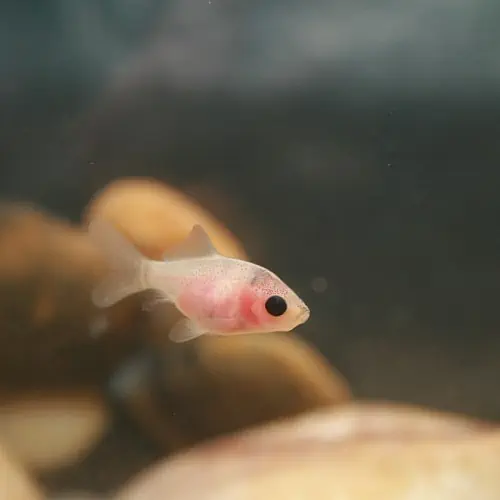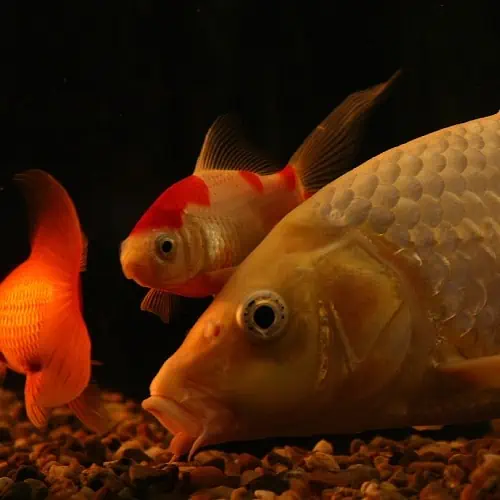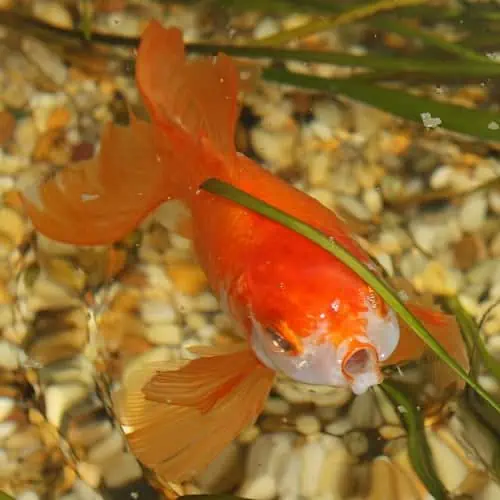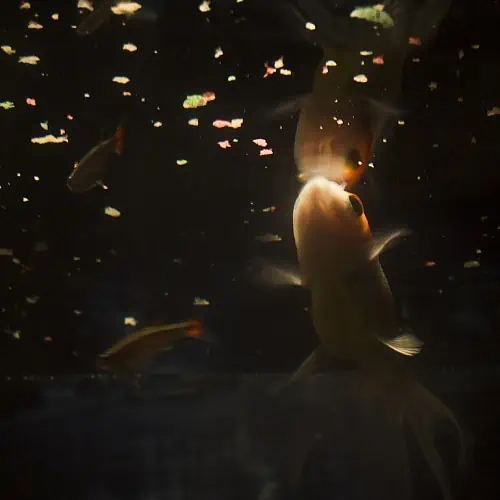Can I Feed My Bass Comet Goldfish
How Often Should I Feed My Outdoor Pond Goldfish? (Goldfish Feeding Guide)

Goldfish are cold-water fish with feeding frequencies that naturally change throughout the year. Their efficiency at breaking down food is dependent on several factors, the most important of which is temperature. As poikilothermic (cold-blooded) animals, goldfish metabolic rates speed up as temperatures increase in the spring and summer. These rates decrease as temperatures drop in order to conserve energy for winter survival.
The rate at which your goldfish will feed is also dependent on their age, health status, and the availability of natural food sources. Understandably, rapidly growing goldfish will need to be fed more frequently as they require more nutrients for internal organ development. Those in large ponds with a more balanced ecosystem (i.e. with pond plants and a sustainable food chain) can be expected to regulate their own food consumption depending on their luck at finding palatable plants or live prey.
In an artificial pond devoid of natural food, your goldfish will rely solely on you to ensure that its metabolic needs are met. This means keeping a close eye on your pond's temperature, goldfish activity levels, and rate of growth. If you rear your goldfish along with koi, a feeding regime suitable for koi fish will suffice as both fish are closely related.
Pond Goldfish General Feeding Frequency
In ponds, young goldfish (less than a year old) can be fed 2 – 3 times per day. The perfect feeding frequency is influenced by the features of your pond and the ambient temperatures in your specific area.
For example, if your pond has nutrient sources that can be taken up by goldfish, you can reduce feeding times to just once per day or once every other day. Goldfish are omnivorous fish that will happily consume edible pond plants, aquatic insects, tadpoles, larvae, and small crustaceans. If water temperatures are optimal (73 – 75˚F/23 – 24˚C) and your pond has a current, you can increase feeding times to two times a day to accommodate your fish's energy needs.
If your goldfish rely solely on you for food, you should initially experiment on feeding frequency and try to observe the rate at which they consume floating food. If they appear to eat less during a second or third feeding period, it may be ideal to stick to just 1 – 2 feeding sessions per day. Keep in mind that older goldfish are less likely to benefit from frequent feeding times and should be fed once per day. The table below should serve as a guide, but feel free to deviate from the figures (frequency should be determined case-by-case).
| Feeding Frequency | Feed Type | ||
| Water Temperature | Young Goldfish | Mature Goldfish | |
| Below 39˚F (4˚C) | Do not feed | Do not feed | None |
| 40 – 50˚F (4.5 – 10˚C) | Less than 2x per week | Once per week | Wheatgerm-based |
| 51 – 65˚F (10.5 – 18˚C) | Up to 5x per week | 2 – 4x per week | Wheatgerm-based |
| 66 – 80˚F (19 – 26.5˚C) | 2 – 3x per day | Once per day | Protein-based |
| 81˚F (27˚C) and up | 1 – 2x per day | Every other day | Protein-based |
| Presence of: | |||
| Natural food sources | Up to 2x per day | 5 – 7x per week | Dependent on temperature |
| Strong water current | Up to 3x per day | Up to 2x per day | |
The last 2 rows above contain frequency adjustments that are more applicable to optimal temperatures. These frequency rates are more generalized compared to those for koi. If you have more koi than goldfish in your pond, make sure to follow the rates indicated here. Feed types are also provided and should be determined by metabolic rates.
In cooler temperatures, goldfish are less likely to metabolize protein-rich food and should instead be fed with more wheat-germ-based food.
Should I Feed My Pond Goldfish in Winter?

As temperatures begin to drop to below 50˚F, goldfish metabolism will slow down drastically. Feeding them at the usual rate could do more harm than good. At low temperatures, many of their digestive enzymes and bacterial flora may become absent or grow dormant. Any food that passes through their system is unlikely to be digested properly.
Poikilothermic fish are able to survive through this harsh part of the year by going into a mild hibernation mode called torpor. They expend hardly any energy at this time, reducing the need for food. However, if you have juvenile goldfish or are rearing the more delicate varieties (fancy goldfish), you may have to bring them indoors to overwinter in a heated tank. If this is the case, your feeding frequency should be adjusted according to tank conditions.
Goldfish Are Bottom Feeders

Though goldfish will readily take up floating food on the water's surface, they are essentially bottom-feeders. It's natural for them to search for food trapped in your pond's substrate or submerged detritus. Those that are reared alongside larger koi may have the tendency to search for any food that has sunk to the bottom instead of competing for food on the surface.
Don't be too alarmed if you see your goldfish foraging on the pond bottom. This isn't always a signal that you haven't fed your fish enough food. In naturalized ponds, especially those with submerged oxygenating plants, goldfish may easily become preoccupied with searching for chance items of prey and uneaten feeds. Do be on the lookout for goldfish that appear to be sitting or are immobile on the pond bottom, as this can be a sign of stress.
Overfeeding Pond Goldfish

Most goldfish will instinctively know how much food to consume in a day. They will seldom take much more than they need to compensate for spent energy. Young goldfish have the tendency to eat more, but they do so to meet their developmental needs. Overfeeding tends to have an indirect effect on your fish. Excess feeds may compromise water quality, which can then cause your fish to grow sick.
Prevent overfeeding by providing just the right amount of food every feeding session. This amount should ideally be consumed within the first five minutes of introduction. You can feed a little bit at a time, taking note of how much food gets consumed fully. Once this time has passed, make sure to remove any leftovers before they sink to the bottom or get trapped in other areas of your pond. If this food is left to break down in your pond, you run the risk of clouding up your water and elevating ammonia and nitrate levels.
Do you Need to Feed Pond Goldfish?

It's highly unlikely that you would underfeed your goldfish as long as you give them food from time to time. The chances of overfeeding them are exponentially higher. That being said, underfeeding does come with its own risks, but is less likely to be an issue in ponds that have natural food sources. Your fish may not necessarily become starved as they are likely to forage for other food.
What may occur instead is an imbalance of nutrients or malnutrition as your fish must heavily depend on whatever is available in the pond. Underfed fish may also have sunken bellies. This symptom might be quite hard to detect, however, and would be even more challenging to see in a pond instead of a glass tank. Instead, aim to provide your fish with a well-balanced diet and regulate feeding times to encourage a healthy appetite.
hazelwoodexambeir1955.blogspot.com
Source: https://pondinformer.com/pond-goldfish-feeding-guide/
0 Response to "Can I Feed My Bass Comet Goldfish"
Post a Comment